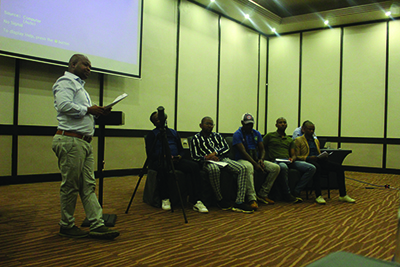By Liapeng Raliengoane
MASERU – The National Policy Dialogue has stressed the importance of Education for Sustainable Development (ESD).
ESD is the United Nations Educational, Scientific and Cultural Organization (UNESCO’s) education sector response to the urgent and dramatic challenges the planet faces.
This dialogue that took place in Maseru last week brought together experts from ministries of Education, Environment, Science and Technology, Natural Resources, Culture, Agriculture, Academia, NGOs, representatives of youth, women and people living with disabilities and those working on ESD and Climate Change Education, members of the ESD for 2030 country initiative working group, the United Nations (UN) Agencies with projects related to ESD and Climate Change Education and UNESCO staff from Regional Office for Southern Africa (UNESCO ROSA).
While opening the dialogue, UNESCO Regional office for Southern Africa Programme Coordinator Dr. Charles Chikunda indicated that the purpose of this national dialogue was to engage policy actors and educational leaders, Community Based Organizations (CBOs) and NGOs involved in ESD initiatives citing an example of Climate Change Education, Environmental Education, and other sustainability initiatives, to advocate for integration and mainstreaming of ESD into policies, curriculum and institutional leadership activities and to support Lesotho to develop a national Strategic Framework for ESD in the context of the ESD for 2030 framework.
Dr. Chikunda listed that the objectives of the national policy dialogue were to: present the SADC ESD strategy to national stakeholders, showcase how ESD is defined, integrated and/or mainstreamed in different sectors of the country and identify elements for drafting a National Strategic Framework for ESD. Identify synergies of on-going national initiatives in ESD, climate change education, the Sustainability Starts with Teachers (SST) programme, and the ESD for 2030 country initiative, identify possible partnerships and funding possibilities for multisectoral ESD work in the country, and provide elements for operationalizing the SADC ESD framework as required by the SADC Ministers of Education, Science, Technology and Innovation.
The Youth Representatives also had a chance to present their organizations and what they are doing and among them were: Keep Lesotho Clean, Laudato Si Youth Movement Lesotho, Sunshine Group, Thaba-Khubelu Conservation and Tours and NUL Innovation Hub.
From the National University of Lesotho, Senior Lecturer in Educational Foundations Julia Chere Masopha shared the achievements and institutional change projects developed under the SST program.
SST is a capacity-building programme for teacher educators on ESD, supporting teacher educators from Early Childhood Education, primary, secondary and Technical Vocational Education and Training to integrate ESD in teacher and TVET education implemented in 11 countries in the SADC region, including Lesotho.
The current programme is towards achieving the SDGs (ESD for 2030), which is the global framework for implementing ESD for the period 2020-2030. ESD for 2030 builds upon the lessons learned from the Global Action Programme on ESD (GAP, 2015-2019), in response to the increased importance placed on ESD to promote the contribution of learning content to the survival and prosperity of humanity.
ESD for 2030 places emphasis on education’s contribution to the achievement of all 17 SDGs. It aims to review the purposes and values that underpin education and reorient all levels of education and learning to contribute to sustainable development and to strengthen quality and relevance of both, teaching and learning.
Lesotho has a functioning working group on ESD for 2030 country initiative. The group is intersectoral, comprising of members from the Ministry of Education, Environmental Sustainability Education Network of Lesotho (ESENeL), as well as researchers and educators from Higher Education Institutions, amongst others; whose core function is to coordinate and report on all ESD related activities in the country. Therefore, the policy dialogue on ESD in Lesotho will further help to strengthen efforts of this working group and discuss its role in drafting and implementing the National Strategic Framework for ESD.


